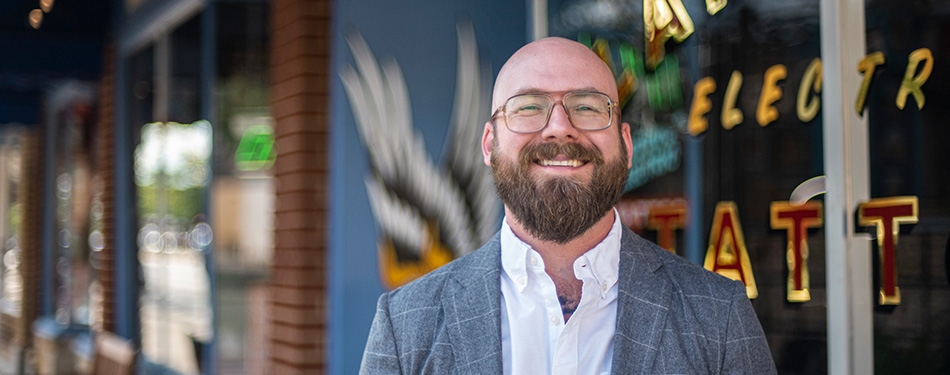Aaron Perzanowski brings expertise in intellectual and personal property law—from libraries to clown eggs—to Michigan Law faculty.
Aaron Perzanowski has always been fascinated by the way technology influences how people express themselves and communicate with one another, and the ways in which the law influences that process.
While he attended law school at the University of California, Berkeley, “because that seemed to be epicenter where people were talking about copyright and intellectual property policy issues,” he is excited to join another place with robust conversations and scholarship in this ever-changing field: Michigan Law.
Historically, libraries have had physical collections and because of the way copyright law is structured, they have had complete control over what they did with those collections. Now, the way big technology platforms work with publishers is creating an eBook crisis.
“The IP faculty at Michigan was a major draw for me,” said Perzanowski, who is joining as the inaugural Thomas W. Lacchia Professor of Law.
“Nicholson Price, Becky Eisenberg, and Jessica Litman are all people whose I work I admire. As someone who writes primarily in the copyright space, Jessica has been a huge influence on my work from the outset. So IP is already an area of strength for the law school, and one I’m happy to contribute to.”
Perzanowski brings with him 13 years’ experience of teaching and writing about the intersection of intellectual and personal property law, most recently during a nine-year stint on the faculty of Case Western Reserve University.
Most of his work (including three books), explores how the notion of ownership has shifted in the digital marketplace.
Navigating copyright intricacies at the library, the tattoo parlor, and campaign events
Currently, Perzanowski is working on a book project about libraries, looking at the ways the shift to digital distribution of books is affecting institutions.
“Historically, libraries have had physical collections and because of the way copyright law is structured, they have had complete control over what they did with those collections,” he said, citing their autonomy when it came to deciding which books to acquire, keep, lend, and remove.
“Now, the way big technology platforms work with publishers is creating an eBook crisis. Libraries are facing paying these skyrocketing license fees that they then must incorporate into their budgets. If you take the books away, will the local library become a kind of electronic storefront for publishers?” he asked, adding that historically libraries also serve communities in a variety of other ways.
But Perzanowski, also looks at the ways informal governance and social norms influence creativity, ranging from tattoos to clown eggs (an egg-based system where the unique makeup face design of clowns is registered to create a kind of informal copyright).
Currently, Perzanowski explained, IP law is based on the assumption that creators have a fundamental legal right to prevent copying, and without this right, they will under-invest in new work.
But the reality, he argues, is creators are compelled and motivated to produce work for reasons beyond economics and have a great capacity for self-governance and innovative social and market responses.
“Right now, I am looking at the impact of political campaigns using musicians’ songs without permission. Musicians complain and I am curious about why. Is it because they politically disagree with the campaign, or does it have an effect on the artists’ popularity or the value of the catalog?”
To research that question, he is looking at industry streaming and downloading data to see how exposure to a campaign using a song affects the favorability ratings of a particular artist.
Taking various approaches to legal scholarship
How Perzanowski approaches his research depends on the project and varies widely. He laments that as lawyers and legal academics, little training is given as to how to engage in research, unlike say economists or environmental scientists.
“I think in some ways, it can put legal academics at a bit of a disadvantage, at least early in your career,” he said, adding that “the upside is it affords a lot of flexibility.”
Sometimes, he said, he decides on qualitative interview research. Other times, empirical research.
For the library project, he is simply reading historical accounts of how public libraries developed in the United States. But he often pursues traditional legal research, as well, such as reviewing past cases.
Teaching, Perzanowski said, is another way he learns.
Before Case Western, he taught at Wayne State University and before that was a visiting professor at the University of Notre Dame and the Microsoft Research Fellow at UC Berkeley.
“There is not a semester that goes by where I don’t get some new piece of information, or some new perspective presented to me by my students. It helps me see things in some new light.”
As for his latest career development, Perzanowski said, “The draw to U-M for me was the opportunity to work with such a great collection of people.”
But he is also looking forward to living in Ann Arbor.
“I’ve always had this sort of romantic idea of living in a midwestern university town, and Ann Arbor is at the very top of that list. It is a visual stereotype of what a university town looks like. I am really excited to live out that imagined version of my life.”
—Jennifer Conlin

